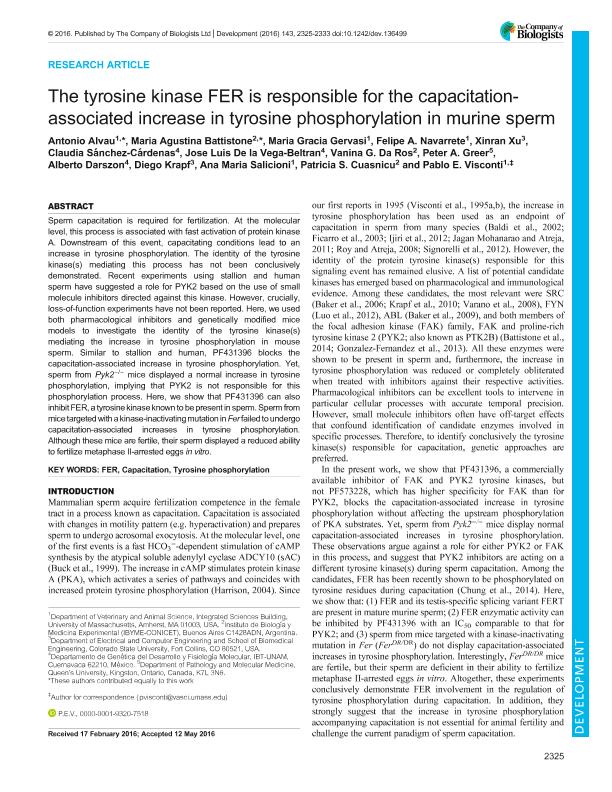Artículo
The tyrosine kinase FER is responsible for the capacitation-associated increase in tyrosine phosphorylation in murine sperm
Alvau, Antonio; Battistone, Maria Agustina ; Gervasi, Maria Gracia
; Gervasi, Maria Gracia ; Navarrete, Felipe A.; Xu, Xinran; Sánchez Cárdenas, Claudia; De la Vega Beltran, José Luis; Da Ros, Vanina Gabriela
; Navarrete, Felipe A.; Xu, Xinran; Sánchez Cárdenas, Claudia; De la Vega Beltran, José Luis; Da Ros, Vanina Gabriela ; Greer, Peter; Darszon, Alberto; Krapf, Diego; Salicioni, Ana María; Cuasnicu, Patricia Sara
; Greer, Peter; Darszon, Alberto; Krapf, Diego; Salicioni, Ana María; Cuasnicu, Patricia Sara ; Visconti, Pablo E.
; Visconti, Pablo E.
 ; Gervasi, Maria Gracia
; Gervasi, Maria Gracia ; Navarrete, Felipe A.; Xu, Xinran; Sánchez Cárdenas, Claudia; De la Vega Beltran, José Luis; Da Ros, Vanina Gabriela
; Navarrete, Felipe A.; Xu, Xinran; Sánchez Cárdenas, Claudia; De la Vega Beltran, José Luis; Da Ros, Vanina Gabriela ; Greer, Peter; Darszon, Alberto; Krapf, Diego; Salicioni, Ana María; Cuasnicu, Patricia Sara
; Greer, Peter; Darszon, Alberto; Krapf, Diego; Salicioni, Ana María; Cuasnicu, Patricia Sara ; Visconti, Pablo E.
; Visconti, Pablo E.
Fecha de publicación:
07/2016
Editorial:
Company of Biologists
Revista:
Development
ISSN:
0950-1991
e-ISSN:
1477-9129
Idioma:
Inglés
Tipo de recurso:
Artículo publicado
Clasificación temática:
Resumen
Sperm capacitation is required for fertilization. At the molecular level, this process is associated with fast activation of protein kinase A. Downstream of this event, capacitating conditions lead to an increase in tyrosine phosphorylation. The identity of the tyrosine kinase(s) mediating this process has not been conclusively demonstrated. Recent experiments using stallion and human sperm have suggested a role for PYK2 based on the use of small molecule inhibitors directed against this kinase. However, crucially, loss-of-function experiments have not been reported. Here, we used both pharmacological inhibitors and genetically modified mice models to investigate the identity of the tyrosine kinase(s) mediating the increase in tyrosine phosphorylation in mouse sperm. Similar to stallion and human, PF431396 blocks the capacitation-associated increase in tyrosine phosphorylation. Yet, sperm from Pyk2(-/-) mice displayed a normal increase in tyrosine phosphorylation, implying that PYK2 is not responsible for this phosphorylation process. Here, we show that PF431396 can also inhibit FER, a tyrosine kinase known to be present in sperm. Sperm from mice targeted with a kinase-inactivating mutation in Fer failed to undergo capacitation-associated increases in tyrosine phosphorylation. Although these mice are fertile, their sperm displayed a reduced ability to fertilize metaphase II-arrested eggs in vitro.
Palabras clave:
Fer
,
Sperm Capacitation
,
Tyrosine Phosphorylation
Archivos asociados
Licencia
Identificadores
Colecciones
Articulos(IBYME)
Articulos de INST.DE BIOLOGIA Y MEDICINA EXPERIMENTAL (I)
Articulos de INST.DE BIOLOGIA Y MEDICINA EXPERIMENTAL (I)
Citación
Alvau, Antonio; Battistone, Maria Agustina; Gervasi, Maria Gracia; Navarrete, Felipe A.; Xu, Xinran; et al.; The tyrosine kinase FER is responsible for the capacitation-associated increase in tyrosine phosphorylation in murine sperm; Company of Biologists; Development; 143; 13; 7-2016; 2325-2333
Compartir
Altmétricas



